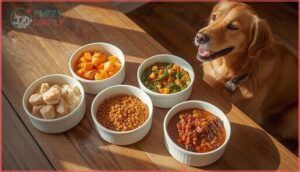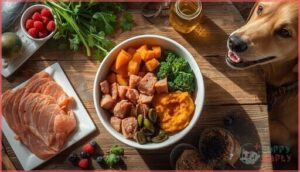This site is supported by our readers. We may earn a commission, at no cost to you, if you purchase through links.

In this article, we’ll provide 2023’s top recommendations for feeding dogs with colitis or IBS. These recommendations include turkey & sweet potato dishes, fish & rice meals, and vegan skillet suppers.
We’ll also give advice on supplementing homemade food and fresh delivery services to ensure your pet gets all the nutrition they need.
Additionally, you’ll discover our favorite pre-made treats specifically designed for pets with colitis or IBD. With these tips in hand, you can rest assured that your four-legged friend is getting all the nourishment they deserve without sacrificing flavor or fun.
Table Of Contents
- Key Takeaways
- Homemade Recipes for Dogs With Colitis, IBD, or IBS
- Supplementing Homemade Dog Food
- Fresh Food Delivery Services for Dogs
- Treats for Dogs With IBD
- Consulting Your Vet Before Making Dietary Changes
- Transitioning to a Homemade Diet for Dogs With IBD
- More Options for Dogs With IBD or Colitis
- Bowel Problems and Homemade Dog Food
- Homemade Dog Food for IBD, IBS, and Colitis
- Frequently Asked Questions (FAQs)
- Is homemade dog food more expensive than store-bought food?
- What ingredients should be avoided when making homemade dog food?
- How often should I feed my dog homemade food?
- How can I ensure that my dog is getting enough nutrients from homemade food?
- Are there any special considerations for puppies when feeding homemade food?
- Conclusion
Key Takeaways
- Homemade diets are crucial for dogs with IBD for optimal nutrition and symptom relief.
- Consulting a vet for diet alterations based on age, weight, and activity level is important.
- Recommended ingredients and recipes for dogs with IBD include turkey & sweet potato, fish & rice, vegan skillet supper, and vegan lentil stew.
- Probiotics, customized supplements, and pre-made treats can be beneficial for dogs with IBD.
Homemade Recipes for Dogs With Colitis, IBD, or IBS
For dogs with colitis, IBD, or IBS, having the right diet is essential. A variety of homemade recipes can provide optimal nutrition and relief from symptoms: Turkey & Sweet Potato Recipe; Fish & Rice Recipe; Vegan Skillet Supper for Dogs; and Vegan Lentil Stew for Dogs.
With these recipes tailored to meet their individual needs, dogs will be able to enjoy a more comfortable life.
Turkey & Sweet Potato Recipe
Try this tasty turkey and sweet potato recipe to help your pup manage their colitis, IBD, or IBS. Prepping tips: cook the turkey first, then add veggies like carrots. Steam or boil broccoli for added fiber.
Portion control is key – consult a vet before altering the diet based on the age, weight, and activity level of your pet. Opt for hypoallergenic diets, which include single protein sources (e.g., duck), as well as easily digestible vegetables like carrots and green beans.
These diets provide vitamins, minerals, and antioxidants from fruits and vegetables, tailored to aid digestive problems in dogs with IBD.
Fish & Rice Recipe
Give your pup a delicious and nutritious meal with this Fish & Rice Recipe. It is packed full of Omega-3 fatty acids to support healthy skin, coat, heart, kidney, and brain. Vitamin E is also included to boost immunity. This recipe is suitable for dogs with allergies or dietary sensitivities as it contains no artificial additives or preservatives.
Store in the refrigerator for up to 5 days or freeze for 2-3 months if necessary. Probiotics and supplements can be added too – talk to your vet about customized servings based on individual needs! Feed 1/2 cup per 25 lbs of body weight twice daily for best results.
Vegan Skillet Supper for Dogs
For your pup’s colitis, IBD, or IBS, whip up a vegan skillet supper that will make even the pickiest eater happy. One dog owner saw her pup devour it in record time! A nutritious blend of lentils and vegetables cooked to perfection makes this meal irresistible.
It is topped with raw meat for added protein and freeze-dried salmon treats for flavor, making it an ideal canine diet. Additionally, it is supplemented with probiotics and omega fatty acids, allowing you to ensure that every serving size meets specific nutritional needs based on body weight.
Vegan Lentil Stew for Dogs
Satisfy your pup’s cravings with this vegan lentil stew, packed full of nutrients to help manage sensitivities and allergies. This detox recipe is an excellent source of fiber from legumes, vitamins, and minerals for immune support, and antioxidants for dietary changes.
It can also provide omega-3 fatty acids found in flaxseed oil or EPA/DHA supplements to aid digestion.
For dogs with IBD, look into single protein sources like duck or rabbit, as well as easily digestible vegetables such as carrots, sweet potatoes, and green beans.
Supplementing Homemade Dog Food
Supplementing your pup’s homemade diet with vitamins and minerals can help ensure their optimal wellness. Probiotics, for example, not only aid digestion but also reduce inflammation caused by food allergies or irritable bowel syndrome.
Protein sources such as chicken, beef, and fish are preferable to provide energy, while fruits and vegetables offer essential vitamins and minerals. A veterinarian should evaluate the dog’s needs before meal planning so they can customize portions according to age, weight, activity level, etc.
Here are some key points to consider when supplementing a homemade diet:
- Incorporate probiotic benefits into meals for improved gut health.
- Choose protein sources that will give your pup sufficient energy.
- Add in fresh fruits and veggies for necessary vitamins and minerals.
- Consider tailored vitamin supplements based on veterinary attention.
- Monitor stools regularly and address any bowel problems immediately.
Fresh Food Delivery Services for Dogs
If you’re looking for an easy and convenient way to ensure your pup gets the nutrition they need, fresh food delivery services are a great option. These services allow pet owners to access veterinarian-approved meal plans tailored specifically to their dog’s individual needs.
From providing customized meals based on age, weight, activity level, and health conditions to helping transition from store-bought kibble or homemade diets, the convenience of doorstep delivery provides peace of mind that your pup is getting optimal nutrition with each meal.
Fresh food delivery also helps manage allergies while ensuring healthy eating habits, as all ingredients used are carefully selected by veterinary experts for quality control purposes.
Meal plans typically include detailed instructions about the transitioning schedule and portion size guidelines, so no matter how busy life is, you know your pet will be well taken care of!
Treats for Dogs With IBD
If you’re looking for treats to help manage your dog’s IBD, colitis, or other digestive issues, there are a variety of options. From homemade apple chips and sweet potato bites to pre-made treats specifically designed for these conditions, you can provide your pup with delicious snacks that also support their health.
Apple Chips
Give your pup a nutritious treat with apple chips to help manage their IBD. Apple chips are an excellent source of nutrition, helping to support healthy digestion and reduce inflammation caused by irritable bowel disease.
They’re also packed with vitamins and minerals that can aid in overall health for pups suffering from IBS or other bowel problems.
Plus, they provide beneficial fiber which helps maintain regularity while providing relief from the symptoms of IBD! Best of all, these treats are easy to make at home using only fresh apples.
Not only will your pup love them, but you’ll get peace-of-mind knowing you’re giving them a natural snack that’s good for their health!
Sweet Potato Bites
Treat your pup to some delicious and nutritious Sweet Potato Bites for a healthy snack. These grain-free treats are made with high-fiber, omega 3 fatty acid-rich ingredients like sweet potatoes and chicken.
To make them at home, try the simple recipe of baking or microwaving the sweet potato at low/medium heat. Then, combine it with cooked chicken in a bowl. Serve 1/2 cup per 25 lbs of body weight twice daily.
This is a great way to incorporate Vitamin E into your pup’s diet while supporting their overall health long term.
Pre-made Treats for Colitis & IBD
Experience the power of single-ingredient, pre-made treats like freeze-dried salmon to boost your dog’s digestive health and keep their colitis or IBD under control.
Try:
- Freeze-Dried Salmon Treats – 100% wild Alaskan salmon with no additives; great for training & rewards.
- Stella Chewy’s Lamb Heart Treats – all-natural, single-ingredient treat made from freeze-dried raw lamb heart.
- Pupford Salmon Dog Treats – simple ingredients & no unhealthy additives; less than 1 kcal per treat!
- Halo Holistic Digestive Health Dog Food – real wild-caught salmon as the primary ingredient plus probiotics, postbiotics & omega fatty acids for gut health and immunity support.
- Dr. Mercola Multivitamin Powder – human-grade vitamins/minerals customizable by pet parents for specific needs!
Pre-made treats can help manage symptoms like diarrhea while supporting age-appropriate nutrition tailored to veterinarian recommendations and total dietary allergies or vegan recipes when needed.
Consulting Your Vet Before Making Dietary Changes
It’s important to consult your veterinarian before making any changes in your pet’s diet for IBD. Tailored nutrition and dietary recommendations can provide relief from the condition. Proper diagnosis and veterinary care are essential for managing allergies, food sensitivities, digestive health issues, and bowel conditions associated with IBD.
Your vet will be able to evaluate the age, weight, and activity level of your dog, along with their health status, to recommend an appropriate homemade diet that meets all nutritional needs. This includes selecting a high-fiber hypoallergenic recipe, which may include single protein sources such as duck or rabbit for dogs struggling with gastrointestinal problems.
In addition, they might also suggest probiotics or herbs like calendula or slippery elm, which help aid the digestion process while providing other potential benefits such as reduced inflammation levels in the body.
Transitioning to a Homemade Diet for Dogs With IBD
Transitioning to a homemade diet for your canine companion with IBD can be an easy and rewarding process. Begin by consulting your vet, as they’ll be able to provide tailored dietary advice based on age, weight, activity level, and health of the pup.
To ensure optimal nutrition without preservatives or food allergies, consider grain-free options that include nutrient-dense ingredients such as chicken liver and canned pumpkin. In addition to these protein sources, consider incorporating fiber sources like sweet potatoes into meals to aid digestion.
Omega-3 fatty acids from wild-caught cold water fish can also help reduce inflammation associated with this condition.
Supplement their meals with probiotics when needed, along with other nutrients recommended by the vet, such as Vitamin E.
Transitioning successfully requires careful consideration of each dog’s unique dietary needs but is well worth it for improved digestive health over time!
More Options for Dogs With IBD or Colitis
For more options to help manage IBD or Colitis in your pup, try adding supplements and other holistic remedies like probiotics and herbs. A vet can customize a diet for your pet that meets their individual needs. Vegan diets are also effective as fresh food offers essential vitamins, minerals, antioxidants, and fiber, which aid digestion.
Probiotic supplements are beneficial too; they support gut health while reducing inflammation associated with the condition.
Additionally, fish oil can be added into meals as an omega 3 fatty acid supplement, which helps promote healthy skin & coat while providing cardiovascular benefits too.
Bowel Problems and Homemade Dog Food
If your pup is suffering from intestinal disorders, such as IBD or Colitis, their diet can play a key role in symptom management. Homemade dog food provides control over ingredients and nutrient levels to support dietary needs – with recipes tailored to the individual’s sensitivities and allergies.
For dogs with bowel problems, high-fiber diets are recommended for regularity. These diets may include ingredients like pumpkin or sweet potatoes. Proteins should come from animal meats like chicken thighs/liver and fish. It is also beneficial to supplement meals with probiotics and omega-3 fatty acids to help maintain gut health and reduce inflammation.
Raw diets are also an option if frozen storage is available. However, meat alternatives such as duck or rabbit should only be used under veterinary supervision due to potential sensitivity issues associated with grains like corn, wheat, soy, etc.
With proper evaluation from a vet, homemade dog food can provide relief while giving pet parents peace of mind knowing they’re providing the best nutrition for their furry family members!
Homemade Dog Food for IBD, IBS, and Colitis
Creating a homemade diet for dogs with IBD, IBS, and Colitis can help manage sensitivities and allergies. You can tailor the meals according to your dog’s individual needs by using ingredients such as animal meat (chicken, beef, or fish), fruits, and vegetables to provide vitamins and minerals.
Fiber-rich foods like pumpkin or sweet potato can aid stool regularity, and probiotics and omega 3 fatty acids can promote gut health. With the right guidance from a vet, taking into account the age, weight, and activity level of your pup, you will be able to create an effective nutritional plan that could offer relief from these conditions.
Ingredients
You’ll want to choose ingredients carefully for your pup’s homemade diet. Think of it like a puzzle, where each piece must fit perfectly together. Animal meat is essential, and chicken, beef, or fish are preferable sources of protein.
Add in fruits and vegetables for vitamins, minerals, and antioxidants. Omega-3 fatty acids from wild-caught cold-water fish, along with probiotics, help maintain gut health.
Nutramax Welactin Dogs & Dr. Mercola Dog Multivitamin supplements can be added as directed by a vet.
Directions
Mixing and matching ingredients to create recipes tailored for your pup’s needs is an effective way to manage IBD, IBS, and colitis. To address allergy management, dietary requirements should be considered. Probiotic supplements can help with digestive issues such as abdominal pain caused by the conditions.
Food additives like omega-3 fatty acids and vitamins are also important for optimal health in a homemade diet.
Frequently Asked Questions (FAQs)
Is homemade dog food more expensive than store-bought food?
It can be more expensive to make homemade dog food, depending on the ingredients and how often you feed your pet. However, it may provide better nutrition for dogs with health issues like IBD or allergies.
What ingredients should be avoided when making homemade dog food?
When making homemade dog food, avoid ingredients that are high in fat or sugar as these can cause weight gain and other health issues. Also, steer clear of artificial preservatives, colors, and flavors which may be harmful to your pup’s digestion.
How often should I feed my dog homemade food?
Feed your pup homemade food two to three times daily, based on age and weight. Start with small amounts and adjust as needed. Use quality ingredients tailored to their individual needs for optimal health benefits.
How can I ensure that my dog is getting enough nutrients from homemade food?
To ensure your dog is getting enough nutrients from homemade food, consult a vet for tailored nutritional needs and formulate recipes with whole ingredients. Include protein from animal meat and fiber-rich fruits/vegetables, plus probiotics and omegas to maintain gut health.
Are there any special considerations for puppies when feeding homemade food?
When feeding puppies homemade food, ensure they’re getting the necessary nutrients and vitamins to grow healthy. For their unique needs, add probiotics for gut health or omega-3 fatty acids for inflammation reduction.
Conclusion
Overall, creating a healthy homemade diet for dogs with IBD, IBS, and colitis can be a difficult task. However, with the right ingredients and advice from your vet, you can make sure your pup is getting the nutrition they need.
From protein-rich animal meats to fruits and vegetables, probiotics, and omega-3 fatty acids, there are plenty of options to choose from. Plus, there are a variety of recipes and treats to keep your pup’s diet interesting and nutritious.
So, like a puzzle, piece together the perfect mix of ingredients and supplements to keep your pup healthy and happy.
- https://go.lemonade.com/visit/?bta=35186&nci=5400&utm_campaign=reusable-dog
- https://www.ncbi.nlm.nih.gov/pmc/articles/PMC7329990/
- https://vetnutrition.tufts.edu/2017/09/the-problem-with-pumpkin/
- https://dogsgo-plantbased.co.uk/wp-content/uploads/2024/03/Food-Allergy-in-Dogs-and-Cats-A-ReviewDownloadRoss.pdf
- https://www.vegdog.de/tessa-steckbrief















